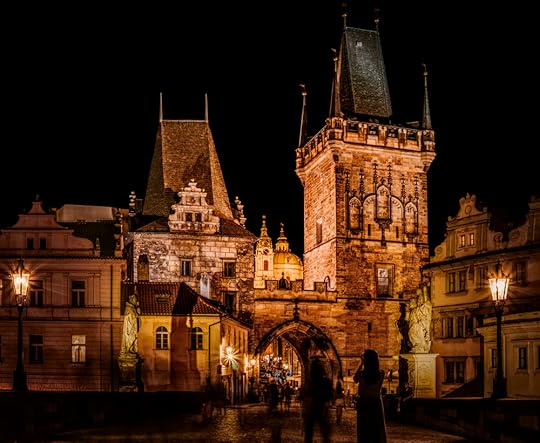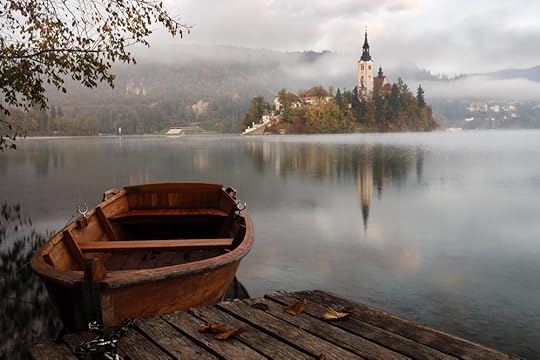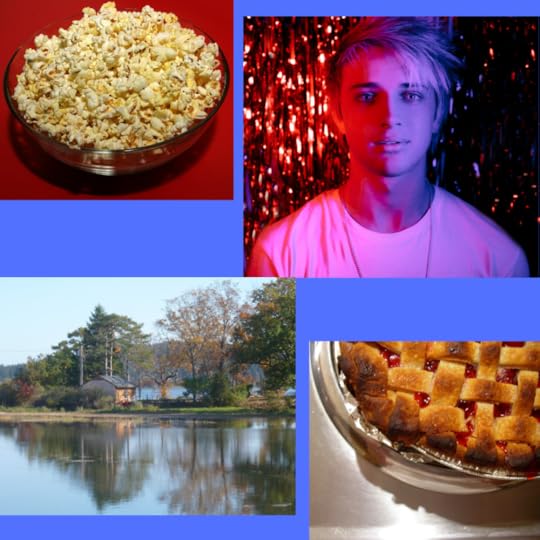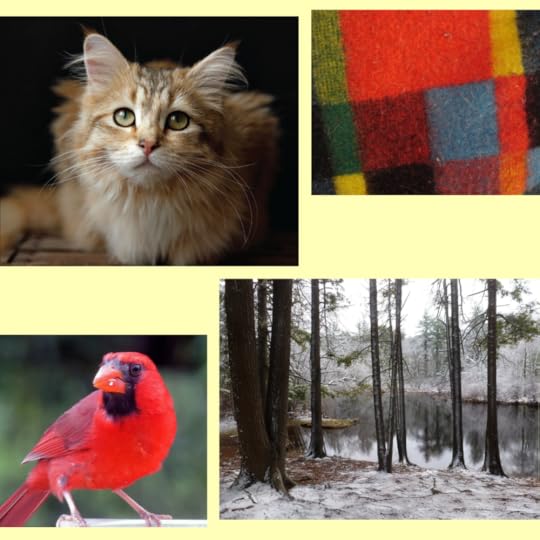Sandi Ward's Blog
June 27, 2019
The Purpose of Fiction
I’ve been skimming through book descriptions online this evening and reading reader reviews, trying to pick out my next read. I’m always amazed how a novel for one person might be “my favorite book of all time” (5 stars) and for someone else is “a waste of time” (1 star). If you’ve never done it, go pick out a few fiction bestsellers and check out a few 5 star reviews and then a few 1 star reviews. It’s eye-opening. I’m consistently stunned by the gap between good and bad reviews. Every best seller has huge fans but also many readers who just didn’t enjoy the book (for a number of reasons).
Everyone is entitled to their opinion. Obviously even the most loved and prestigious authors don’t write books that appeal to everyone—how could they, when opinions and preferences vary so widely?
A sentence one reader included in her book review has stuck with me. (I won’t name the book, nor the author….nor the reader. But I’ll note that the novel is a New York Times bestseller, in the historical fiction genre.) This reader wrote: “There was a lot of sadness in this book perhaps the author wanted life to be real but this was a novel and I wanted to escape.”
What this woman wrote drove home for me the point that readers seek out fiction for very different reasons. To be informed. To be uplifted. To learn something new. To grieve. To celebrate. To be emotionally moved. And yes, to escape. And that’s okay, to come to a story with your own expectations.

I hope that reader finds the book she’s searching for, one that helps take her away from the drudgery (or pain, or loneliness) of her own life.
Someone once said that “Art should comfort the disturbed and disturb the comfortable.” (I have seen this quote attributed to multiple people, and I’m not sure who was the original. The poet Cesar Cruz? The artist Banksy? The journalist Finley Peter Dunne? Let me know if you know!) I like the quote, and I think it could be applied to many great books that shine a light on injustice. But, of course, the quote fails to describe other stories that are dedicated to cheerful tellings and happy endings.
Sometimes a book is a work of art, and it shakes up our world view. Other times, a book is a refuge, a lifeboat of hope and happiness when our own real lives are sad enough.
What do you expect books to do for you?
April 19, 2019
My hopes for Season 8 of Game of Thrones (HBO)
It’s been a few days since I watched Episode 1 of Season 8 of Game of Thrones. This is it. The end. The final season. And we’ve been waiting for two years! So anticipation runs high. For such an epic, expensive series, I think fans are justified in having high expectations.
I know the season opener didn’t satisfy everyone. A New York Times critic compared it to Downton Abbey because it was “somewhat soapy” and served up a big helping of “high-stakes melodrama”. Of course, many fans of GoT love the show precisely because it usually avoids sentiment. Not one but two reviews by writers from Vulture actually compared Episode 1 to the The Bachelor, where Jon and Dany have a cinematic one-on-one date, riding dragons (for too long) and having a “moment” by a waterfall.
I agree that Episode 1 felt a little off in tone and I experienced that same disconnect. Several scenes seemed to lack urgency despite the fact that the White Walkers are coming, but I understand that there were many reunions the writers needed to get out of the way. I’d give it a solid B as far as a season opener goes. Let me talk about what I didn’t like first, and get that out of the way.

I was super excited when the show began, and loved the new spin on the opening credits. But once Episode 1 was over, none of my friends texted me in shock and awe. Episode 1 was to some degree a summary of what had come before; and the writers set up future action, moving characters into place like pieces on a chessboard before the game begins.
My daughter, who isn’t a GoT fan, watched with me and was decidedly not impressed with the dragons. She actually chuckled and asked if we were watching Merlin. (Don’t get me wrong. We absolutely loved Merlin when we saw it on Netflix. But Merlin did have “Star Trek-the-original-TV-show” level of special effects. Which is to say: cheap.) I think the dragons on GoT are more impressive if you just see short, ominous cuts of them flying overhead. I didn’t agree with the choice to have a dragon staring at and interacting with Jon Snow; it’s never a good idea to give a dragon too much to do unless you can bless that dragon with the voice and acting skills of Benedict Cumberbatch (as in Smaug of The Hobbit). Otherwise, it comes across as too cutesy. And the scene where Jon Snow rides a dragon with Dany was out right out of Peter Pan—”We can fly! We can fly! We can fly!”
Back on the ground, I didn’t love the Housewives of Westeros sniping between Sansa and Daenerys. The sarcastic comebacks reminded me of the one-liners that are periodically thrown into a superhero movie. I love when Tyrion is clever or snarky, but this was just corny. I would’ve preferred arrogance and pride from Dany, and anger and distrust from Sansa. The jokes felt contrived and far from the real emotion those scenes could have and should have provoked.
The Vulture article I mentioned above also calls out the show for putting three naked women in a scene with Bronn while he gets ready to have sex while clothed, apparently. It felt extraneous and not as interesting as I imagine the writers thought it would be.
Okay, enough about the downsides. On to what I’m excited for in the rest of Season 8.
There are many theories about who will end up on the Iron Throne (presumably someone…rather than the Seven Kingdoms being split up). I don’t think it will be Jon or Daenerys. That would be too predictable, and it’s hard to imagine a universe where George R.R. Martin would allow it. I can’t imagine a Happy Ever After ending of any sort, so I don’t think it will be Jon and Dany’s baby either. (Dany reminding everyone repeatedly about the prophecy that she cannot bear children [stating that only the dragons are her children] has led some to believe this might be somehow setting up her eventual pregnancy by Jon. I don’t quite see it, but…you never know with this show.) There’s also speculation that they’ll have a baby and then sacrifice it to the Night King. The conspiracy theories run wild.
Personally, I’ve always had my money on Gendry, as the son of Robert Baratheon, and I wouldn’t mind if Arya joined him as queen. I’d also be satisfied if Sansa took the throne for herself, with or without Tyrion by her side (as husband in name only or as an advisor), bringing a Queen Elizabeth fierceness to the role. And if the writers decide to go in a completely different and utterly unpredictable direction, then I’ll bless that ending, as long as it makes sense as part of the bigger picture. The Washington Post recently described the fan theory about Bran and the Night King somehow either being or becoming the same person and taking the throne…Yeah, it gets complicated. And somewhat weird. But this is a major reason why I favor GoT as a show—it keeps me guessing.
I hope the much-promoted long fight scene against the White Walkers has moments of rest and connection or dialogue in-between the battle action. I don’t like when the climactic fight scene runs on too long in superhero movies. I start to tune out. So I’m cautiously hopeful for the GoT battle. As long as there is some strategy involved and it’s not simply a free-for-all in hand-to-hand combat that goes on for 80 minutes, I think it will be okay.
One aspect that will keep me glued over the next few episodes is seeing who lives and dies. Surely, based on past seasons, we will see the death of major characters. And hopefully not all will perish simply in battle with the White Walkers; there must be some scheming left to be done among the once rivalrous humans.
The only character I would truly be surprised and disappointed to see die is Tyrion. I remember when he spoke to young Jon Snow in Season 1 when they were both feeling like outcasts. I have the hunch that if any character is going to endure, it will be Tyrion. But we’ll see. Maybe he’ll end up sacrificing himself for some greater good.
I also wonder if George R.R. Martin has some bigger world-building conclusion in mind…meaning, perhaps the ending won't be as simple as defeating the White Walkers and putting someone on the Iron Throne. Will the world be plunged into a 100-year winter despite the defeat of the WW? Or will the humans kill them all, robbing the world of winter and plunging the Seven Kingdoms into heat and drought, setting up a new challenge for a future leader? What if “Summer is coming”—and that’s not a good thing? I’d love to see some unexpected, off-the-wall (forgive the wall reference) consequences after the epic battle to come.
Many terrific TV shows have come to unsatisfactory conclusions. My greatest hope is that GoT maintains its’ traditional excellence and lets the writers take this thing to whatever messy conclusion seems natural—I’d rather not see everything tied up in a neat bow.
Do you have your own hopes and dreams for how Game of Thrones ends?
March 9, 2019
3 Ideas for Crafting a Great Short Story
Let me begin by saying I’m not an expert on writing short stories. I don’t write them often. When we studied short stories in high school, I loved reading them. In the publishing world today, it seems that novels are king, and fewer short stories are published—but you can still find them, primarily in literary publications.
Seeing as that I’m not an expert, I called this blog post “3 ideas” for crafting a great short story—not 3 “rules” or 3 “guidelines”. First of all, I don’t believe in following the rules. I’m an intuitive writer. You do need to know the rules, but then you can break them if you have a rationale for doing so.
I recently won First Place in the 2018 Writers’ Digest Popular Fiction Awards for a short story I wrote titled Eighteen. This is a Young Adult/Fantasy story that started out as an attempt to write a Fantasy novel. I really wanted to try world building, and I was excited to write a story with DRAGONS.
Guess what? Writing Fantasy is incredibly complicated and I should probably stick to contemporary fiction!
But writing that novel was not a waste of time (writing is never a waste of time), because I realized I could distill down some of the best elements of the novel into an effective short story. In a short story, you’re not expected to recreate a whole world; rather, I think of it as a snapshot of a specific place and time in a fictional world.

I’ve come up with 3 elements that I think contribute to a great short story. These are based solely on my personal thoughts as a reader. This is what I gravitate to when thinking about a short story that excites me.
Sensory detail
If you’re going to immerse a person in your fictional world in a very short amount of time, it helps to infuse the story with sensory detail. The heady smell of a freshly mown lawn. The feel of gritty dirt on the palm of someone’s hands. The searing pain of a sprained shoulder. Get the reader involved immediately, as if they’ve plunged into a pool.
Consider a twist
I don’t necessarily mean a plot twist, although many famous short stories end with a “didn’t see that coming!” change of fortune. A twist could simply mean that not everything is as it seems in the beginning, and maybe some information is not revealed until later in the story. Or perhaps a character’s perspective is not as expected, or his actions don’t match his thoughts. Readers love to be surprised.
In Eighteen, I included a few subtle twists, where some readers will stop and say—wait, what? That’s not what I expected. I enjoy subverting reader expectations.
Throw out what you know about writing a story arc
Short stories aren’t necessarily like a novel in that they need a plot with a beginning, middle and end. Some beautiful literary short stories are a series of moments that end with an emotional revelation.
In John Updike’s A&P, you can find what you might call traditional plot points: the inciting incident (girls come into the store in bathing suits) and resolution (the main character, a teenager, quits his job at the A&P).
In Raymond Carver’s Cathedral, the main character sketches a cathedral for his visitor, who is blind, yet nothing is exactly resolved or tied up in a bow. And that’s okay. It still makes an emotional impression.
Final thoughts
I suppose the last thought I have is that in a short story, every word counts. Make sure every single word in every single sentence is the right one, the one that evokes the tone and impression you mean to convey.
Do you write short stories? What do you think are the elements of a great short story?
January 8, 2019
Outlander, Season One (STARZ)
“Oh, aye, Sassenach. I am your master . . . and you're mine.
Seems I canna possess your soul without losing my own.”
I read the first book in the Outlander series a few years ago, and enjoyed it at the time. I didn’t continue with the series because the books are epic in length (800+ pages) and it seemed like a large time investment; I’ve got too many other books on my to-read list to devote months (or even years) to one series. But I did find it exciting and fascinating. So here I am, a few years late in joining the fandom for the STARZ TV adaptation—but better late than never.

So! Let me get a quick summary out of the way: a 20th century British nurse (Claire Randall, in the 1940s) finds herself thrown backwards through time into revolutionary 18th century Scotland (1743). A man who is the spitting image (and distant relative) of her loving husband turns out to be a cruel British Captain (“Black Jack” Randall, played by the same actor). When she finds herself in his clutches, a handsome young Scotsman (Jamie Fraser) comes to Claire’s rescue. Sex and violence ensue. Got all that?
This book and show are based on an amazing genre mash-up, which includes sci/fi time travel, historical fiction, action/adventure and steamy hot romance. And yes, it works. It reminded me of Kathleen Flynn’s novel The Jane Austen Project, a novel I loved that effortlessly combined genres to excellent creative effect. I find it truly breathtaking when an author can successfully pull off such a feat. So bravo to author Diane Gabaldon, giving credit where credit is due.
So how did the production team do in its’ interpretation of the book? The setting of the Scottish countryside is gorgeous. I can imagine the director just told the cinematographer to turn on the camera, and let the lens linger on this beautiful vista or that ancient castle, and viola! Beauty! Of course, it could not have been that easy, and the location scouts did their jobs well. The same care was taken with the costumes, props and Scottish language/dialect coaching. Everything feels accurate; clearly they had the budget and know-how to get the details right (or, at least, make them believable).
Now for the problematic elements. The book and show depict sex and violence with such frequency it seems a bit off-the-wall sometimes. #MeToo has happened since Season One, and the fact that there are multiple rape or attempted rape scenes across several episodes (and sometimes within the same one hour episode) can make that plot choice seem a bit piled on.
The quote at the top of this review captures another problematic element. Claire is definitely a feminist, yet must comply to a subservient role once fate has her marry Jamie (for plot reasons…and also for love reasons). Historical accuracy is one thing, but of course this is a story with sci/fi elements, so let’s not pretend there weren’t other options than having Jamie beat Claire for disobeying his orders. I think it was actually intended to be humor. Whether it’s funny or not may depend on your perspective. The husband as the dominating master and wife as servant also seems to hint at an erotic element, yet the Claire/Jamie sex scenes come across as a joining of equals (with both the man and woman getting similar screen time and attention), so I’m not completely sure what the author and director intended there.
So does Outlander need to be re-assessed in the wake of #MeToo? It doesn’t seem to bother the fans of the book and show, who still feel passionately about the characters and their story. Perhaps future books (or in my case, TV seasons) will take the story in new directions.
The show is bit melodramatic at times, but you’d expect a time-traveling historical romance to be so, wouldn’t you? I don’t find fault with that. The show has enough action and twists to satisfy most audiences.
OUTLANDER (STARZ)
Grade: A-
Genre: Mash-up of sci-fi, historical fiction, romance, and action/adventure
Why watch? Beautiful cinematography, swashbuckling action, sweeping heroic elements, romance that spans from “true love that lasts through the ages” to bawdy and racy. Very entertaining TV viewing.
Concerns? As stated above, the show is overly reliant on rape as a plot point. Also, the otherwise strong feminist elements are at times overshadowed by depictions of domestic violence as okay because “that’s how it was at the time”.
December 26, 2018
Introducing Kate
Hello readers! I’ve been posting about some of the characters in my new novel, Something Worth Saving, and today I thought I’d write a little about Kate Anderson, who my cat narrator Lily calls Mom. Kate is a mother of three teenagers, and she’s recently kicked her husband Jeremy out of the house. Lily hopes Kate will tell Jeremy he can move back home, but Lily also knows that Kate has been very upset with Jeremy…who won’t stop drinking no matter how many times Kate asks him not to.
In this graphic, I include the beach because the Anderson family lives down the road from the shore (in Massachusetts), and I imagine Kate enjoys relaxing under a beach umbrella when the weather is warm enough. She’s exhausted and worried about her marriage, so she escapes into books. For better or worse, she’s also been distracted by a new man, Mark. He likes to bake, and wins Kate over by bringing her what he’s made at work, represented by the blueberry muffins. Finally, Kate has red hair, which Lily notices gleams when the sunshine hits it.
Something Worth Saving is out now, available on Amazon, Barnes & Noble, and wherever books are sold!

December 14, 2018
Introducing Victoria
I’ve been occasionally posting collages to introduce readers to the characters in my new novel, Something Worth Saving (on sale date December 18, 2018). In this graphic, you’ll learn a little about Victoria Anderson, the middle child of the Anderson family.
Victoria is 16 years old, and a tough cookie. She’s strong willed; Victoria doesn’t let her older brother Kevin boss her around, and she’s protective of her younger brother Charlie. Victoria has a new boyfriend named Aidan, and Lily (my cat narrator) doesn’t like him very much. She’s worried that Aidan might be bullying Charlie.
So…on to the graphic!
Coffee: Victoria likes to think of herself as a little more mature than other kids her age, which might include drinking coffee both for the caffeine, and also to help her look more sophisticated.
Victoria favors heavy eye make-up and black nail polish. Lily respects Victoria’s personal style, although she suspects it in part may be a desire for attention, especially since Victoria’s dad got kicked out of the house.
The beach: The Andersons live in northern New England, right down the road from a beach where Victoria spends many summer days—except for those weeks in late July when the greenhead flies are out, and they’re all reluctantly trapped indoors.
If you read the book, I hope you enjoy this character. Victoria is a boss! I enjoyed writing her scenes.

December 3, 2018
Introducing Charlie
I’ve already written a blog post about the cat narrator of Something Worth Saving, Lily. Now, I’d like to introduce you to Lily’s favorite person, 14-year old Charlie. Attached is the “character board” I made for Instagram. Let me tell you about it!
Favorite food. Charlie loves snack food, naturally. Popcorn is salty, buttery, simple to make in the microwave, and perfect to share with friends—what’s not to like if you’re a hungry 14-year old?
Time for a change. In the first scene of Something Worth Saving, Lily (my cat narrator) is shocked to see that Charlie looks different—he’s skipped school, gone to his friend Karen’s house, and let her bleach his hair. I imagine he saw someone like Dalton Rapattoni on TV, and thought: yeah, I’d like to try that!

The river. The Anderson family lives in a northern New England town, on Cape Ann, and right on a river. There’s a sailing club across the street from their house, and Charlie sometimes watches the boys as they get ready to go out. Charlie doesn’t sail, but he thinks it looks like fun.
Cooking. Charlie is curious about cooking, in part thanks to his mom’s new friend Mark, who works at a local restaurant. Okay, yes, he still loves his popcorn and other junk food. But when Charlie watches Mark make healthy, homemade breakfast and desserts, he starts to think that maybe cooking is something he’d enjoy.
November 26, 2018
Ozark, Season One (Netflix)
Season One of OZARK is an 10-episode show on Netflix (Season Two is now available, also 10 episodes). If you’re a fan of Jason Bateman, who plays financial advisor Marty Byrde, maybe you’ve checked it out. If you were looking for a little humor, you might have been confused to find yourself in the middle of a dark drama about a money launderer.
I suppose another reason to tune in might be to see a little of scenic Missouri. My husband attended the University of Missouri. He never made it out to the Ozarks, but felt surprised to find it depicted as seedy and backward. The characters call it the “Redneck Riviera”. Since the show’s characters interact with the underbelly of society—drug dealers, strippers, thieves—perhaps we’re only getting a glimpse of what the Ozarks have to offer.

It sure looks pretty…if only it weren't so dangerous!
I enjoyed Season One of OZARK. It reminded me of Breaking Bad in some respects. It’s based on the same premise: a straight-laced “good guy” chooses to enter into a serious, violent criminal world for financial gain. But the two shows are different enough to keep my interest. The secondary characters are richly drawn, especially Ruth (played by Julia Garner), who in my mind is the #1 stand-out star of the show. Laura Linney is also engaging as Marty’s wife, Wendy Byrde. Each bad guy is worse than the last, allowing for surprises and plot twists. Overall, the acting is excellent.
I see reviews are mixed for the show, and I feel the same way. One reviewer calls it thrilling, and another calls it bland. It’s a little hard to pinpoint my exact reservations, but overall I’d say the weakness of the show might lie in the fact that at times it feels like a show I’ve seen before. I’ve seen many shows with families that get mixed up with crime or the mob—The Sopranos, Boardwalk Empire. Animal Kingdom—that serve up slow-paced, quiet scenes to build suspense and then utilize violence for shock value. Unfortunately, after watching a number of these shows, it all simply becomes much less shocking. I sympathize somewhat with the antihero characters, but it’s not love. It is never love. So I end up feeling a little detached.
Will I tune in for Season Two? Well, not right away. I’m going to let Season One sink in a little bit, and jump from Missouri over to Scotland for Season One of Outlander.
OZARK (Netflix)
Grade: B
Genre: Crime drama
Why watch? Fantastic performances, interesting characters, surprising plot twists.
Concerns? The show depicts a dark view of humanity, where innocence is quickly dashed and pure hearts don’t exist (or come across as laughable and naive). There is no one character I love—no one who, if they died, would cause me to throw a shoe at my TV. I enjoy complex characters, and as an author I write men and women who make a lot of of horrible mistakes, yet I also like to provide readers with scenes of forgiveness, of fun, of joy, of faith. Ozark doesn't serve up moments of redemption, which leaves me a little ambivalent about the outcome. It’s intriguing, but I’m not completely emotionally invested.
November 20, 2018
Something Worth Saving: Introducing Lily

I can’t wait to share the story with the world!
It’s hard to believe that Something Worth Saving is just one month from launch! I’ve been working on promotion and getting the word out about the book. I’ve also been writing and editing every day, as my 3rd novel for Kensington (What Holds Us Together) is due to my editor in mid-December. Combine that with the usual holiday madness, and it’s going to be a busy end to the year!
In the next few weeks, I’ll be sharing a little about some of the characters in Something Worth Saving through “character boards” on Instagram, and I’ll add them here to my blog in case you’re curious to learn more!
My cat narrator in this story is Lily. Lily’s full name is Lily J. Potter (named after Harry Potter’s mother…yes, I’m a JK Rowling fan, can you tell?) I created this collage below to represent some of Lily’s favorite things in life.
Lily loves snoozing on a warm blanket. It doesn’t have to be super soft. Wool is fine. She especially enjoys lounging on the blue blanket on Charlie’s bed. Charlie is the youngest of the Anderson kids, age 14, and he’s Lily’s favorite person.
Birding! Yes, Lily will stalk birds and even kill one on occasion to leave at the Anderson family doorstep as a token of her devotion.
Exploring the woods is also a favorite activity. The Andersons live in a woodsy and marshy area of Cape Ann, Massachusetts. It’s meant to be a town like Ipswich or Gloucester—somewhere near a river (or inlet) and down the road from the beach.
Something Worth Saving goes on sale December 18th! I’ll post about Charlie next week. Thanks for reading!

July 13, 2018
"You think this story's over, but it's ready to begin"
The title for this blog post is a quote from the Beastie Boys rap song Paul Revere. (Hey, I'm a child of the '80s. What can I tell ya?) In the rap, the narrator wraps up a scene, but then uses this line to essentially say—yes, that chapter is over, but here's where the story gets really exciting.

Photo by Imgorthand/iStock / Getty Images
Misdirection. Red herrings. Chapter-ending cliffhangers. Characters acting out of character.
As a mentor in a writing program last year, I had the privilege of advising authors who were looking to establish themselves, and help them sort out some of the feedback they received from agents. Based on that experience, I decided to write today's blog post about creating characters and stories that are fluid and unpredictable. This can be one way to keep a reader's (and an agent's) attention.
I love to incorporate the unexpected in my writing, because those are the type of story twists I love to read. It's as simple as that.
When a character I thought was a goodie suddenly breaks bad, or a baddie slowly begins to redeem himself, my heart races. I prefer characters that are written in shades of grey—not all good, or all bad. This is why, in the Harry Potter series, Snape will always be many times more interesting to me than Voldemort.
When a novel is moving toward what seems like a foregone conclusion, but then the plot moves off in a completely different direction, I'm intrigued. Sometimes an author is carrying me along from Point A to Point B, but then just when I'm getting comfortable, she throws in an unexpected detour to Point C. That grabs my attention!
For example...?Well, let's say we are reading about an ambulance that's racing to the hospital because our protagonist is suffering from a heart attack. I worry for the protagonist. Will she live? Will she make it to the hospital in time? But what if... at a red light, the ambulance is car-jacked by a teenager with a gun who wants to go for a joy ride? Now we've got a new problem, one that makes the situation exponentially more precarious.
For a time, I used to post stories online, and from that experience I learned a few essential elements that have improved my writing. For example, if you're posting one chapter a week, you'd better end on a cliffhanger or at least have some pressing unanswered questions in the story, or what's there to compel a reader to come back in a week's time to read the next chapter?
Of course, I fell into a few bad habits from my online writing, too. Sometimes I ended a chapter so abruptly that I didn't really wrap it up. I had to re-learn that each chapter needs a beginning, a middle and an end.
Another outcome of scheduled online writing is that you're forced to come up with an exciting new chapter every week, whether you're in the mood to write or not. So I would try to make it entertaining, both for myself and for the readers I was trying to please and retain from week to week.
Since I'm a pantser and not a plotter, I often naturally end up going off in unexpected directions—wherever the characters want to go. And if the forward movement of my story starts to slow, I can sense it. That's where the teenager with the gun suddenly appears, to hijack that ambulance and throw everyone off their game.
Could your story benefit from a few red herrings, startling plot twists, or unanticipated character development?



